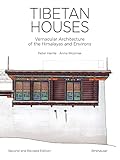Tibetan Houses : Vernacular Architecture of the Himalayas and Environs / Peter Herrle, Anna Wozniak.
Material type: TextPublisher: Basel : Birkhäuser, [2023]Copyright date: ©2023Description: 1 online resource (304 p.)Content type:
TextPublisher: Basel : Birkhäuser, [2023]Copyright date: ©2023Description: 1 online resource (304 p.)Content type: - 9783035626872
- 9783035626902
- 720
- online - DeGruyter
- Issued also in print.
| Item type | Current library | Call number | URL | Status | Notes | Barcode | |
|---|---|---|---|---|---|---|---|
 eBook
eBook
|
Biblioteca "Angelicum" Pont. Univ. S.Tommaso d'Aquino Nuvola online | online - DeGruyter (Browse shelf(Opens below)) | Online access | Not for loan (Accesso limitato) | Accesso per gli utenti autorizzati / Access for authorized users | (dgr)9783035626902 |
Frontmatter -- Table of Contents -- Acknowledgements -- Foreword to the second edition -- INTRODUCTION -- LADAKH -- CENTRAL TIBET: U-TSANG -- EASTERN TIBET: KHAM AND AMDO -- BHUTAN -- KHUMBU -- DOLPO -- STRUCTURAL DESIGN -- TIBETAN HOUSES – VANISHING OR CHANGING? -- References -- Additional literature -- Picture credits -- The project team
restricted access online access with authorization star
http://purl.org/coar/access_right/c_16ec
Die Himalaya-Region und das angrenzende tibetanische Plateau zeichnen sich durch eine sehr eigenständige, traditionelle Wohnkultur aus, die heute im Verschwinden begriffen ist. Das Buch analysiert im ersten Teil 21 traditionelle Wohnhäuser aus dieser Region, die, geprägt durch die jeweilige Lage und das entsprechende Klima, von einer großen Diversität zeugen. Im zweiten Teil werden die konstruktiven Elemente, wie etwa Mauer, Dach und Fassade, anhand von Bildern und präzisen Konstruktionsdetails vergleichend dargestellt. Durch die detaillierten, maßstäblichen Zeichnungen ermöglicht das Buch eine hervorragende vergleichende Analyse. Detaillierte Pläne, atmosphärische Fotos und informative Texte nehmen die Leser:innen mit auf eine Reise in eine faszinierende Baukultur, die bis heute inspiriert.
The region of the Himalayas and the adjoining Tibetan plateau is known for its unique and characteristic vernacular architecture and housing culture which is slowly but surely disappearing. The first part of the book analyses 21 traditional houses in the region that respond in diverse ways to the specifics of their location and local climate. The second part presents a comparative study of the construction elements – walls, roof and façades – using photographs and hand-drawn construction details. The newly produced scale drawings provide an excellent basis for comparative review. Detailed plans, atmospheric photographs and informative texts take the reader on a journey through a fascinating building culture.
Issued also in print.
Mode of access: Internet via World Wide Web.
In English.
Description based on online resource; title from PDF title page (publisher's Web site, viewed 02. Jun 2024)


